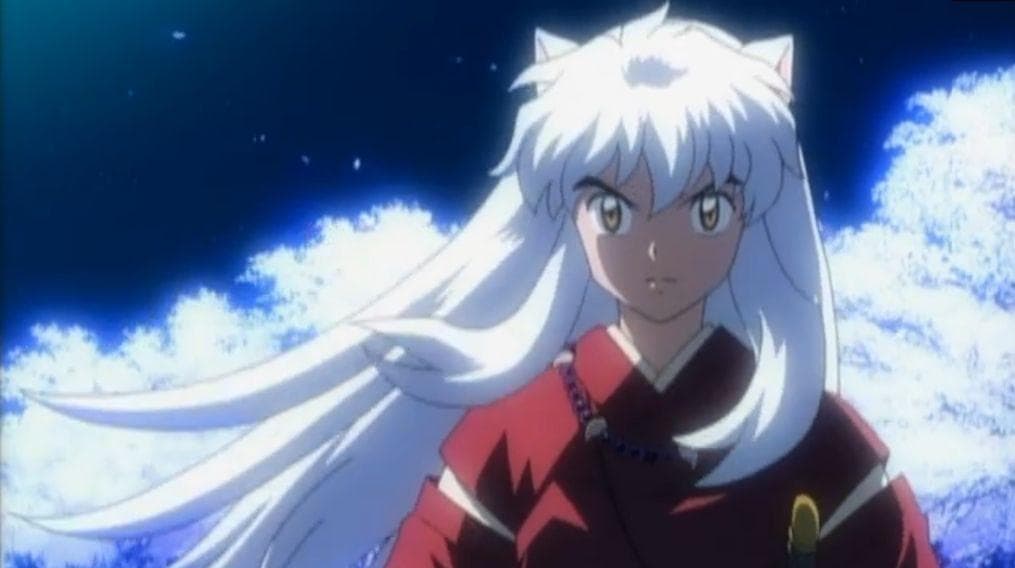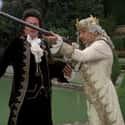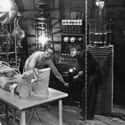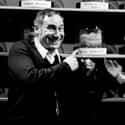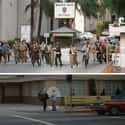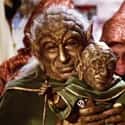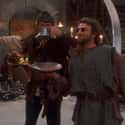-
(#1) Brooks Paid Orson Welles $25,000 To Narrate ‘History of the World, Part 1’ - And He Knocked It Out In Half A Morning
Nothing stings more than overpaying. This is a feeling Mel Brooks knows all too well. In 2015, Brooks admitted he had done just that when hiring Orson Welles to narrate History of the World, Part I.
“He was supposed to do five days of work, from 9 a.m. to 5 p.m., narrating scenes,” Brooks explained, but after Welles began his morning voice test, they were on a roll. “He started to test his voice out about 10 [minutes] to 9 a.m. By 11:30 a.m., 12 o’clock, he had done all the narration.” Bewildered, Brooks acknowledged, “It was all perfect.”
-
(#2) Brooks Screened His Alfred Hitchcock Parody ‘High Anxiety’ For Hitchcock Himself, And The Director Left Without Saying A Word
Though best known for his irreverent satire, Mel Brooks also had a very respectful approach when asking for the blessing of the directors of movies he parodied. Most famous is his interaction with The Birds director Alfred Hitchcock, a master of suspense both on-screen and in reality. Brooks personally sat next to Hitchcock - one of his directing idols - at a premiere screening for his parody of Hitchcock films, High Anxiety. In the movie, Brooks portrayed the head of the “Psychoneurotic Institute for the Very, Very Nervous.”
Brooks recalls watching the film next to Hitchcock in his autobiography, All About Me:
I had my own high anxiety awaiting his reaction. He didn't laugh. He just sat and he watched. He only broke up once. When the birds let go and plastered me with their droppings, then I could see his shoulders shaking. When the film was over, he got up and walked out. He didn't say he liked the picture. He didn't say he hated the picture. He didn't say anything. He just left.
I was devastated. And really worried.
After the screening, Hitchcock walked out without a word. Brooks feared his parody was now a “dead man walking,” and that he had somehow upset his directorial hero. Days later, Hitchcock sent Brooks wine and a note that read, “A small token of my pleasure, have no anxiety about this.” This thumbs up makes it obvious why the film is dedicated to Hitchcock.
-
(#3) ‘Young Frankenstein’ Used The Actual Laboratory Props From The 1931 Film ‘Frankenstein’
If you’re making a spoof of a Frankenstein movie, why not literally hire some of the people who worked on the original? When filming Young Frankenstein, Brooks tapped Ken Strickfaden, who had worked on the lab sets for the 1931 Frankenstein film by James Whale.
When Brooks visited Strickfaden, he was delighted to find that the designer had stored all of the equipment from the previous set right in his garage. Strickfaden gladly made a deal to rent out the equipment to Brooks and got the screen credit he was cheated out of in the original Frankenstein films.
-
(#4) Brooks Broke Off His Original Deal For ‘Young Frankenstein’ Because The Studio Refused To Shoot In Black And White
Negotiations with big studios can feel like a game of creative tug-of-war. This is a dance Mel Brooks knows very well. When shopping Young Frankenstein around, he faced initial pushback from Columbia when he insisted on shooting the film in black and white to match the styles of the Hollywood horror classics he was emulating.
When Columbia hated the idea, he turned to 20th Century Fox, who initially agreed to shoot it on color stock so they could, they claimed, "release it in color in Peru." Brooks refused this ruse and ultimately shot his film in black and white.
-
(#5) At The End Of ‘Blazing Saddles’ When Everyone’s Running Out Of The Warner Bros. Lot, The Confused Man Watching Them Was An Actual Bystander
It’s a pretty common dream to end up in a Hollywood film - but what about accidentally? During the end of Blazing Saddles, the Sheriff and the Waco Kid are chased through the Warner Bros. studio backlot. As they run past the front gate of Warner Bros., they pass an innocent bystander who gawks at them, unsure what was happening. It turns out, that was an actual random bystander who happened to be walking by the Warner lot and walked into the shot.
In typical Mel Brooks fashion, he embraced the genuine emotions the man showed, and instead of doing another take, he had the man sign a waiver. You really don’t know when you’ll get your big break.
-
(#6) Brooks Cut Just One (Very Dirty) Joke Out Of ‘Blazing Saddles’
Mel Brooks is known for pushing the envelope, and it’s natural that his films would do the same. Blazing Saddles truly pulled no punches with either its satire of prejudice or its raunchier moments, but there was one joke Brooks pulled at the last minute.
When Lili Von Shtupp (Madeline Kahn) character seduces Bart the sheriff (Cleavon Little) in the dark, Von Shtupp asks Bart if a certain size-related stereotype is actually true. A confused Bart responds, "I hate to disillusion you, ma'am, but you're sucking on my arm."
-
(#7) George Lucas Told Brooks He Wouldn’t Sue Him Over ‘Spaceballs’ On One Condition: No Toys
Spaceballs, the 1987 spoof of the original Star Wars trilogy, was known for toeing the line between emulation and parody. Mel Brooks confessed to Entertainment Weekly that he was afraid to get sued by Lucas. After all, the Star Wars franchise was and remains a financial juggernaut within the industry. When Brooks reached out to Lucas, Lucas was fine with the Spaceballs film being produced, with one caveat: no merchandise.
Brooks, of course, complied, but it was ironic since one of the most iconic Spaceballs characters, Yogurt, was famously over-enthusiastic about merchandising. Though it’s a shame no toys were officially produced, every once in a while, an eagle-eyed fan may be able to spot an unofficial figurine on Etsy.
-
(#8) Brooks Banned Microphones On The Set Of ‘Silent Movie’ In Case The Studio Tried To Go Back On Their Word
Although the studio gave him the greenlight to make Silent Movie totally without audio, they were reluctant to allow production to move forward without any safeguards. The studio asked if they could still record audio “just in case.” In response, Brooks banned microphones on the set, just in case a studio executive tried to record under the table.
"They said 'Go ahead,'" he explains. "'Make your silent movie. But, Mel, do us a favor. Just as a safeguard, record dialogue. Please.' What? Just as a safeguard? I banned the microphone! We didn't even rent one for the picture! 'Just as a safeguard, Mel, against doing a radio program, why don't you bring along the television cameras?'" Ultimately, Brooks won this fight, and his Silent Movie stayed quiet after all.
-
(#9) When Filming ‘The Producers,’ The Actual Producer Offered Brooks $50,000 To Find A Better-Looking Actor Than Gene Wilder
Directors and producers frequently clash over casting, especially if the director fights for someone less well-known. Mel Brooks had this issue when finding the perfect star to play the timid Leo Bloom in The Producers. Brooks wanted Gene Wilder, with whom he had worked in the past. The film's producer, Joseph E. Levine, wanted an actor who was more traditionally handsome. Levine thought Wilder was “funny looking” and even offered Brooks an extra $50,000 to find a more attractive actor.
The two reached out to Dustin Hoffman, but they lost him to what later became his iconic role in The Graduate. With Hoffman off the table, the field became open again for Wilder.
-
(#10) The Cast Of 'Robin Hood: Men In Tights' Learned Swordfighting From A Trainer Who Worked With The 'Original' Hollywood Robin Hood
Just as Brooks hired someone who worked on the original Frankenstein film to work on his Frankenstein parody, Brooks also brought in veteran Hollywood stuntman and trainer Victor Paul to train the cast of Robin Hood: Men In Tights. Paul had performed or coordinated stunts on more than 200 films, including several with Errol Flynn - the most famous portrayer of Robin Hood in Hollywood's Golden Era.
Brooks was adamant that the film still needed to have exciting and believable swordfighting, since it was still a Robin Hood movie, so the cast spent every weekend during shooting working exclusively on their swordfighting. Paul did note that lead actor Cary Elwes was already way ahead of the game since he trained for months working on the swordfighting duel in The Princess Bride.
-
(#11) Aside From Co-Writing ‘Young Frankenstein,’ Brooks Also Provided A Bit Of Specialized Sound Design To The Film
Everyone knows Mel Brooks’s laugh - but what about his howl? When it came to the sound effects for Young Frankenstein, Brooks tapped into the animal within.
From the wolf that howls during the carriage ride, to the voiceover of Victor Frankenstein, to the screech of the cat that gets darted, Brooks added some surprising sounds to the film.
-
(#12) ‘Blazing Saddles’ Originally Had An Oscar-Winning Actor In The Gene Wilder Role - Until He Started Vomiting On Set
Knowing your lines is half the battle, but for Gig Young, getting them out was the hard part. For his role as Jim the “Waco Kid” in Blazing Saddles, Oscar winner Gig Young seemed like he would be the perfect fit. Coming fresh off of 1969’s They Shoot Horses, Don't They?, Young had an uncanny ability to balance light comedy and drama. Young also had a dark past as an alcoholic, however.
When he began shooting his scenes for Jim, Young wasn’t spewing his lines, but instead, his lunch. Young’s agents apologized and tried to reason that “he’s a recovered alcoholic.” Brooks put it more frankly, saying, “He ain’t quite recovered." Frustrated, Brooks called Gene Wilder, who played Leo Bloom in Brooks’s 1968 movie The Producers.
New Random Displays Display All By Ranking
About This Tool
Our data comes from Ranker, If you want to participate in the ranking of items displayed on this page, please click here.








